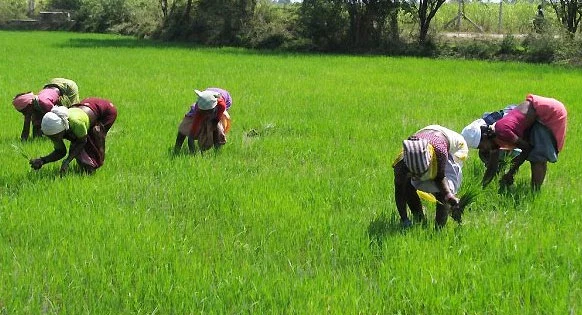Farmers have warned that devastating famine looms following the current challenges facing food production. The warning was given by the Chairman, Board of Trustees, BoT, National Agricultural Foundation of Nigeria, NAFN, Arch Kabir Ibrahim, in an opening address at the 16th edition of the National Agricultural Show held along Abuja-Keffi Road in Nasarawa State. Ibrahim who also doubles as the National President, All Farmers Association of Nigeria, AFAN, and President, Nigeria Agribusiness Group, NABG, maintained that smallholder farmers remain the engine-room for the nation’s food production, therefore, if they are not incentivised and given the needed support the situation would be terrible.
However, he acknowledged the effort of the Tinubu-led administration in facilitating agribusiness investments to the tune of $4.3 billion based on the recent Memorandum of Understanding, MoU, Nigeria signed with Brazil to boost agribusiness. He said this would also certainly give further incentive to the smallholder farmers as it will generate agribusiness in all the 774 Local Government Areas, thereby attracting $4.3 billion investment from the private sector to agriculture. He said “There are,indeed,many efforts by government and many Nigerian farmers to bolster our food system but we are still grappling with crushing inflation and many harrowing experiences around affordability and access to food generally. The Tinubu Administration declared a state of emergency on food security, which got our smallholder farmers to work assiduously to actualize the attainment of food sufficiency but they need further push to be able to help Nigeria attain food security. Nigeria is at a point of despair today and God forbid even on the cusp of experiencing famine so how do we arrest the drift
keeping all the threat factors constant?
“It is exceedingly difficult to attain food security today without first identifying regional staple foods and scaling their production, processing,distribution as well as adequately storing surpluses properly and consuming them moderately and appropriately. We must also minimize post harvest losses by evolving adequate cold and dry storage,as well as constant recycling and appropriate disposal of food waste. Indeed, the full deployment of good science, technology and innovation in the improvement of our food system will definitely give the optimum push necessary to usher in the rapid attainment of food security regardless of the seeming myriad threat factors.”
The AFAN boss stressed that, “Insecurity is today the number one threat factor to the attainment of food security followed closely by climate change so we must all work very hard to be able to mitigate these calamitous impediments.” Meanwhile, he counseled that, “Approaching the issue of the attainment of food security region by region and thereby identifying actual staples through the collective efforts of the Subnational governments at all levels, the federal government and all farmers will be more efficacious than the broad approach now in place. “The efforts of smallholder farmers to scale their productive capacities must be sustainably supported by governments at all levels so that they become Small Scale Producers, SSPs, who will be able to support sustainable industrial growth which will in turn provide the impetus to attain the desired national food security.
“We can do this if we implement the lofty policies already in place from the fine points of Agricultural transformation Agenda (ATA), Agriculture Promotion Policy (APP) up to National Agricultural Technology and Innovation Policy (NATIP) with the farmers as special (M & E) monitors and evaluators.” Meanwhile, he called on Nigerians to join hands together to ensure the country is food secure by 2025 by supporting smallholder farmers. He added that, “The issues around cost of funds, access to credit, budgetary allocations, agroecology, geo-mapping water management and input availability,etc.are definitely work in progress and should be addressed going forward.”

